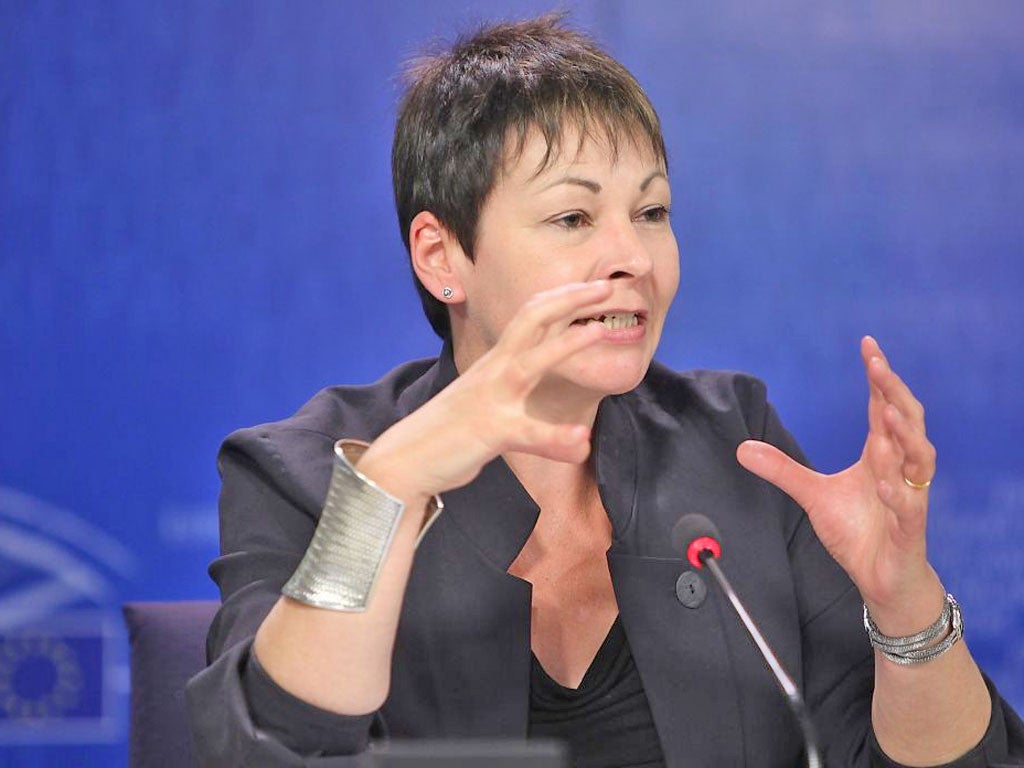Greens urged to ape Lib Dems' polling tactics
Leader Lucas says her party can bring about a realignment of the left

Your support helps us to tell the story
As your White House correspondent, I ask the tough questions and seek the answers that matter.
Your support enables me to be in the room, pressing for transparency and accountability. Without your contributions, we wouldn't have the resources to challenge those in power.
Your donation makes it possible for us to keep doing this important work, keeping you informed every step of the way to the November election

Andrew Feinberg
White House Correspondent
The Green Party is to copy the campaigning techniques of the Liberal Democrats in a bold attempt to become the third-biggest force in British politics.
As the Greens prepare to name their new leader tomorrow, the party's first MP, and outgoing leader, Caroline Lucas, claimed that using the Lib Dem model to build support in town halls and European elections could eventually lead to a much-heralded "realignment of the left".
Despite the party consistently polling just 3 per cent nationally, Ms Lucas believes that, as she hands the reins over, it could be on the verge of an electoral breakthrough.
The Green Party's growth in the past decade has been extraordinary. In 2002, it had just 5,268 members and donations came to just over £62,000. Last year membership had more than doubled to 12,842, and donations totalled £422,205. Over the same period Lib Dem membership has fallen by a third. Since the coalition was formed there has been a surge in under-30s joining, with Young Greens now making up a fifth of members.
Targeting disaffected Lib Dems makes electoral sense. Polling by ComRes in May revealed 28 per cent of Lib Dem voters said they would "seriously consider" voting Green, compared with 19 per cent of Labour voters and 5 per cent of Tories.
Ms Lucas said: "We are moving ourselves into Lib Dem areas. There is a clear opportunity there for people who wanted to vote for a party that wasn't going to increase tuition fees, was concerned about the environment, and was going to act on social justice.
"The Lib Dems got where they are by the same rigorous targeting, and we have learnt a lot from that. Our goal is to get rid of this Tory government. What we need is a new realignment of the left, between Labour, Lib Dems and the Greens."
From scrapping Trident to ditching tuition fees, much of the Green pitch sounds eerily like what the Lib Dems used to stand for. However, the party opposes spending cuts, believing them to be "counter-productive", and says investment is needed to stimulate growth and "protect the most vulnerable".
Taking control of Brighton and Hove council, as a minority administration, last year has not been without problems, not least implementing cuts. Officials talk of the "courage" of councillors in "exceptionally challenging times". But it has tested the party's principles to their limits, and leaders have been stung by recent criticism over waste, including spending £30,000 on an advert for a new city-council chief executive, trading on the city's reputation as the country's "mod" capital. Just as with the Lib Dems in the coalition, the Greens found the reality of power meant difficult decisions. A plan to raise council tax to protect services was blocked by Labour, meaning more cuts were needed.
Green Party policy is set at annual conferences, the latest of which is in Bristol this week. The new leader will use the role to raise their own profile, and hopefully win an election, as Ms Lucas did in 2010. Candidates include Pippa Bartolotti, a businesswoman who drives a gas-guzzling Jaguar ("Yes, it does damage my image within the Green Party"); Peter Cranie (favourite to win, the Scot was narrowly beaten by the BNP's Nick Griffin in the 2009 European polls); Romayne Phoenix, who chairs the Coalition of Resistance opposing the Government's cuts; and Natalie Bennett, a former journalist, who wants six MEPs by 2014, and a Green councillor in every area by 2020.
They have a hard act to follow. Since becoming the party's first leader four years ago, Ms Lucas has seen the Green Party secure its first seat in the Commons, after she won Brighton Pavilion.
As well as running Brighton and Hove, the party is the main opposition on Norwich City Council. In total it has 133 councillors in England, two London Assembly members and two MEPs. And in one of the biggest electoral shocks of 2012, the party's candidate in the London mayoral polls, Jenny Jones, came third behind the Ken and Boris show, pushing the Lib Dems into a humiliating fourth.
The 2014, European Parliament elections are the next big challenge, with hopes of winning seats in the North-west (ousting Mr Griffin), the South-west and Eastern regions. At the next general election, Norwich South will be the main target seat; the Greens came fourth there, with 14.9 per cent of the vote, in 2010.
Ms Lucas hopes to continue as a Green MP for "many years", with more joining her in the House. The party's coffers have been bolstered by £90,000 in Short Money, paid to opposition parties in the Commons.
Subscribe to Independent Premium to bookmark this article
Want to bookmark your favourite articles and stories to read or reference later? Start your Independent Premium subscription today.
Join our commenting forum
Join thought-provoking conversations, follow other Independent readers and see their replies
Comments